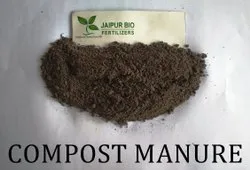Organic Compost Fertilizer
₹10,000.0
Product Description:
This product is designed for use in agriculture and is of organic grade. It is available in a packaging size of 50 Kg, packaged in HDPE bags. The product size is 50 Kg.
Excessive use of chemical fertilizers has seriously impaired soil fertility, leading to a decline in grain production. Research shows that the overuse of fertilizers depletes organic carbon in the soil, negatively affecting its fertility.
To address this threat, the use of bio-manure, specifically Organic Compost fertilizer, proves to be highly beneficial. Organic Compost fertilizer is abundant in carbon and contains essential nutrients like Nitrogen, Phosphorus, and Potassium (NPK). By incorporating Organic Compost into the soil, it helps maintain a balanced organic carbon level, thus preserving optimum productivity and soil fertility.
Specifications of Organic Compost Fertilizer:
Potassium as K20: 1.5%
Nitrogen as N: 2.0%
Phosphorus as P2O5: 0.51%
Zinc as Zn: 115 mg/kg
Calcium as C: 2.5%
Magnesium as Mg: 1.0%
Sulphur as S: 1.2%
Iron as Fe: 400 mg/kg
Organic Carbon: 36.5%
C: N Ratio: 18.3:1
Bulk Density: 0.88
pH: 7.4
Moisture Content: 30%
Beneficial Bacteria Tests:
Total Viable Bacterial Count as N Bacteria: 1.1 x 10^6 CFU/gm
Total Viable Bacterial Count as P Bacteria: 1.1 x 10^6 CFU/gm
Unique Benefits of ORGANIC COMPOST FERTILIZER:
Improves the physical, chemical, and biological properties of the soil.
Enhances soil structure, air circulation, and water retention capacity.
Prevents leaching of nutrients from the root zone.
Contains essential micro and macro-nutrients required for plant growth.
Accelerates the breakdown of crop residues, improving soil texture and nutrient availability.
Increases crop yield and quality for various crops.
Easy application as both base-dressing and top-dressing.
Improves alkaline and saline/sodic soil conditions.
Supports root growth by enhancing soil structure.
Ultimately enhances crop yield by improving soil fertility and structure.
Suitable for field crops, vegetable crops, orchards, kitchen gardens, and flowers.
Requires a relatively low application rate of 15-20 Tons/acre compared to press mud compost (1-2 Tons/acre).
You must be logged in to post a review.
Q & A
Organic manure is derived from renewable sources like plant and animal waste, making it a sustainable alternative to non-renewable resources used in chemical fertilizers. It also decomposes naturally, reducing environmental impact.
Organic manure improves soil structure, fertility, and water retention. It enhances microbial activity in the soil, leading to better nutrient availability for plants and fostering a healthier ecosystem.
Organic manure releases nutrients slowly, reducing the risk of nutrient leaching and pollution of groundwater, rivers, and lakes. It also lowers the overall environmental impact of agricultural practices.
General Inquiries
There are no inquiries yet.



Reviews
There are no reviews yet.